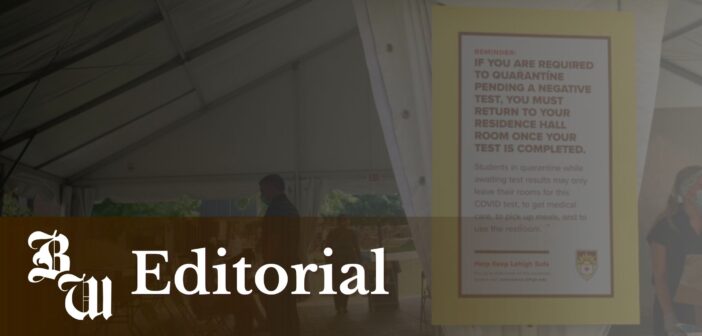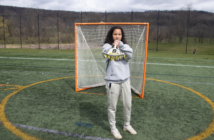Coinciding with a nationwide surge in COVID-19, is back to school season. But with recent reformulation of major vaccines and new guidance from the Centers for Disease Control and Prevention (people over six months of age should now get an annual shot), the framework for approaching the pandemic may change for the best.
While some remnants from peak pandemic still float around campus — like posters and sanitation stations — protocols and awareness toward illness have almost completely fallen back.
With the gravity of COVID winding down, Lehigh has changed in slow and subtle ways: masks aren’t required at all times, plexiglass doesn’t separate tables in dining halls and students are free to sit at a non-socially-distanced seat on the Packer Express.
Alongside these changes are peoples’ behavior and the language surrounding COVID.
Despite the notion that the danger has passed, infections are rising. Hospitilizations and deaths are lower than they were in 2020 and 2021, but they’re still worse than the flu.
“Covid fatigue,” and not the mind-fog symptom associated with the virus, is the term some may use to describe their exhaustion with the preoccupation with all things COVID.
And yet, the respiratory virus still lingers as a peril to daily life, no matter how much its presence is denied.
If a student falls ill, Lehigh’s Health and Wellness Center will point to the CDC for guidance. Neither of these resources are updated the way they were three years ago. This means those stricken with sickness are left in limbo of what protocol they should follow.
Loosened guidelines leave more wiggle room for people to act as they please if they test positive — that is, if they even take the risk of taking a test when they experience symptoms. And without specific and up to date guidelines on what to do, social responsibility is now up for interpretation.
The fear of a positive result is one thing, but the fear of having to put your life on pause is another one. For many, having to quarantine and hault daily activities is perhaps even scarier than getting sick.
In our third year of living with COVID, we’ve reached a point where most people have either been infected themselves or have been surrounded by those who have it.
Throughout all of this, we’ve grown tired. Tired of adhering to protocols, tired of staying home, tired of wearing a mask and tired of talking about it. COVID’s not-so-physical symptoms have left a wound that has yet to heal for many.
So can we trust each other — especially those who are positive, exposed, or have the power to make the issue worse — to look out for other people? Or will they be apathetic, even towards those who are immunocompromised?
The pandemic has been difficult to put things plainly. It forced people to change their lifestyles and to figure out how to deal with this change on their own.
Was our behavior inadequate before the pandemic, and did it show us how to be adequate? And with severity of illness declining, have we forgotten the lessons we’ve learned from COVID?
Must we analyze our hand-washing processes again? And more seriously, does public safety play a larger role in our modern daily world than it did before? We think so.
Instead of using these lessons and adapting to a new normal, we’ve reverted back to our old norms, the normal from before the pandemic.
But the reality is the situation is ever-changing and everyone — you, your neighbors, your health care professionals, your government — is learning as we go along. With endemic status, we cannot go back to the pre-pandemic world. That world no longer exists.
Yet, it’s true that the majority of healthy, vaccinated young adults can live in the post-COVID world with some amount of comfort. But it’s hard to argue that this privilege should be taken for granted or conflated with arrogance. It’s still possible to be hospitalized, face long-standing health consequences or pass the virus to someone who’s immunocompromised. Neglecting how others continue to be affected by the pandemic is naive at best and selfish at worst.
So, we get that everyone is tired of talking about COVID. For most, it’s not the end of the world. But that doesn’t mean it should be forgotten. It’s still here and likely here to stay.






Comment policy
Comments posted to The Brown and White website are reviewed by a moderator before being approved. Incendiary speech or harassing language, including comments targeted at individuals, may be deemed unacceptable and not published. Spam and other soliciting will also be declined.
The Brown and White also reserves the right to not publish entirely anonymous comments.
2 Comments
Excellent appeal to adopt responsibility.
What’s the point of this? Really hard to follow.